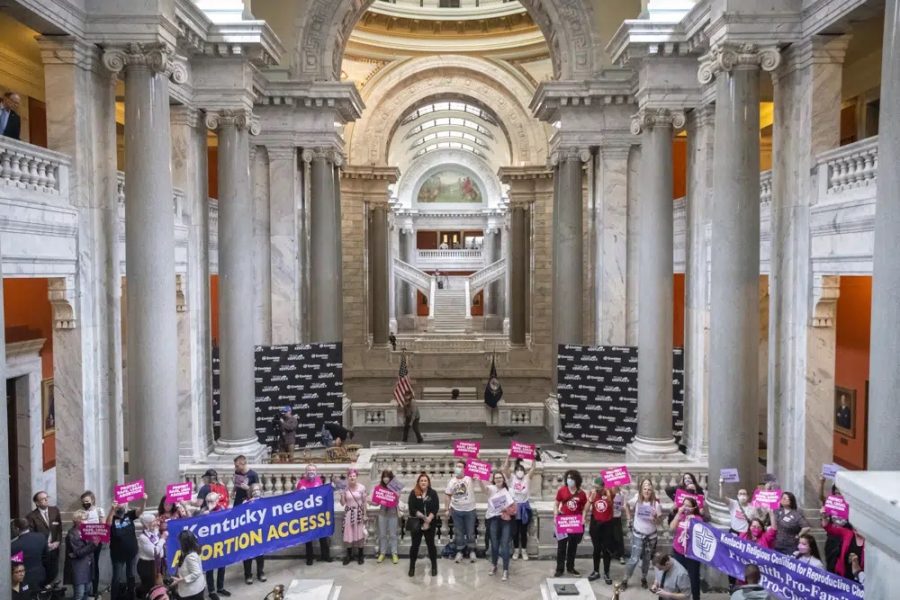Kentucky Supreme Court upholds abortion ban
Protesters speak against abortion bans at the Kentucky State Capitol in April 2022 (Photo courtesy of AP).
March 2, 2023
The Kentucky Supreme Court ruled on Feb. 16 to uphold the state’s near-total ban on abortion, which includes previously passed trigger laws that went into effect August 2022.
House Bill 148, passed and signed into law in 2019, states abortion will become illegal effective immediately in Kentucky, following the U.S. Supreme Court decision to overturn Roe v. Wade in Dobbs v. Jackson Women’s Health Organization.
This law does not allow exceptions for cases of rape or incest. However, abortions can be performed if the patient is at risk of death or to prevent disabling injury.
There is no clear answer from Attorney General Daniel Cameron on what is considered life threatening, but in vitro fertilization, miscarriages, preeclampsia and ectopic pregnancies would be seen as life threatening. There is also no straightforward indication on what is considered a disabling injury.
Assistant Professor of Political Science Kevin Elliott said the decision to overturn Roe can cause a lot of confusion, especially for those who move between states.
“It makes it very difficult for Americans to kind of know what the rules are in any given policy situation,” Elliott said. “There are some arguments that it’s good to have this kind of variation because it makes things that allow policy to vary with the opinions of the people in different states. On the other hand, it comes with this big sort of cognitive burden on citizens that it becomes very difficult for them to know what is the law.”
Hutch Williams, a senior political science major, said these bans will increase the number of unsafe abortions in the state.
“A lot of people in these states where there is a total ban do not realize that abortion in the majority of countries in the world is synonymous to health care,” Williams said. “Therefore, without the option of health-sanctioned abortion, birthing peoples will be forced to receive dangerous procedures that could end with the death of a person seeking abortions.”
The latest legislative action on abortion is HB 300, which would charge anyone who gets an abortion with homicide.
Despite the bans on abortion, the majority of Kentuckians are in favor of the right to choose.
The League of Women Voters of Kentucky reports 52.3% of individuals voted “no” on Amendment 2 in November 2022, while 47.7% voted “yes.” This amendment would have declared there is no constitutional right to an abortion.
While these bans are in place, Elliott said they can help spur people to advocate for their rights.
“They are mobilizing to get their voices heard on this issue where they might have previously thought that this was a settled issue that they didn’t need to be overly concerned about,” Elliott said. “Going forward, you might actually expect there to be more attention paid to this issue as women mobilize into the political system, as they join groups, as they lobby legislators to try to make them listen to them because abortion has sparked an interest and a concern in them for politics, but their concern might extend beyond abortion.”
Many organizations, like the ACLU and League of Women Voters, have advocacy groups in Kentucky that promote certain issues important to women. These organizations aim to increase political engagement and knowledge on a national, state and local level.
The Center of American Progress found banning abortion only increases the number of unsafe abortions and recommends showing commitment to issues like creating a comprehensive sex education course for students, better access to emergency contraception, insurance coverage of and public funding for family planning services and programs that curb domestic violence and sexual abuse.
Williams said legislators should work to update sex education courses and provide students with the information they need in order to practice safe sex.
“They refuse to teach all of us standardized sex education, which could effectively prevent unwanted pregnancies by demonstrating how to use effective birth control, how you could prevent getting a variety of sexually transmitted diseases and creating an open environment to talk about problems relating to sex,” Williams said.
The ACLU of Kentucky has since released a statement since the Kentucky Supreme Court decision, saying they were disappointed in the Court’s decision but would continue to fight for bodily autonomy and reproductive freedom.
“Once again, the Kentucky Supreme Court failed to protect the health and safety of nearly a million people in the state by refusing to reinstate the lower court order blocking the law,” according to the ACLU of Kentucky. “Even after Kentuckians overwhelmingly voted against an anti-abortion ballot measure, abortion remains banned in the state.”
jsmith194@murraystate.edu





























































































